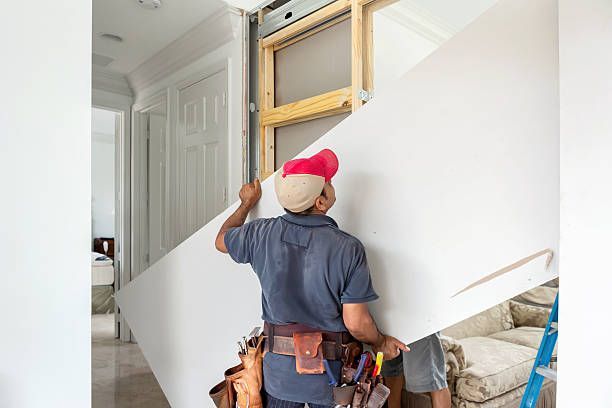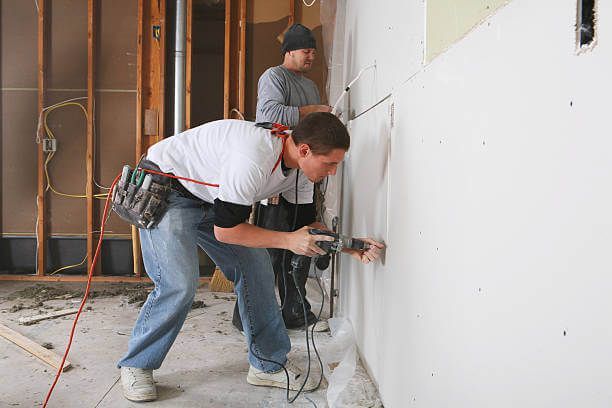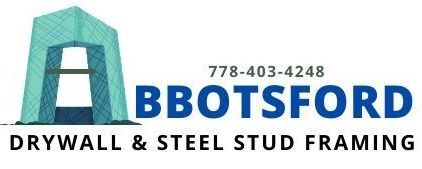Abbotsford Drywall and Steel Stud Framing
Drywall Abbotsford:
Choosing the Right Drywall Thickness for Your Project
When it comes to constructing or renovating a space, the selection of materials plays a vital role in ensuring the project's success. One such material that holds significant importance in the construction industry is drywall.
The thickness of drywall can seem like a small detail, but it can have a profound impact on the overall outcome of your project. As you can see, the thickness of drywall is more than just a technical specification; it has real-world implications for the success of your construction project. Choosing the proper drywall thickness is an important choice that should not be disregarded, regardless of whether durability, soundproofing, or fire resistance are your top priorities.
Let's dive into the world of drywall thickness and discover how this seemingly small detail can make a big difference in the outcome of your project.

Understanding Drywall Thickness Options
Regarding drywall thickness, several options are available in the market, each serving specific purposes and catering to different construction needs. The most commonly used drywall thicknesses are 1/2 inch, 5/8 inch, and 3/8 inch. These standard thicknesses offer a balance between strength, functionality, and ease of installation.
1/2 inch drywall is the most widely used thickness for interior walls and ceilings in residential and commercial construction. It strikes a good balance between cost-effectiveness, ease of handling, and durability. This thickness is suitable for most common applications and provides sufficient strength for normal wear and tear in residential settings.
On the other hand, 5/8-inch drywall offers increased strength and enhanced fire resistance compared to 1/2-inch drywall. It is commonly used in areas requiring additional durability and fire protection, such as commercial buildings, high-traffic areas, or spaces where building codes mandate its use. The added thickness of 5/8 inch drywall improves impact resistance, reducing the likelihood of dents or holes.
In certain specialized applications, such as curved walls or ceilings, 3/8 inch drywall can be used. This thinner drywall is more flexible and easier to bend, making it suitable for creating unique architectural features. However, it is important to note that 3/8 inch drywall is not as strong as the standard 1/2 inch or 5/8 inch options, and therefore, it will not be suitable for areas with higher impact or load-bearing requirements.
When choosing the appropriate drywall thickness for your project, it is essential to consider the space's specific requirements, including its intended use, building codes, and any specialized needs such as soundproofing or fire resistance.
Factors to Consider when Choosing Drywall Thickness
There are many considerations when choosing the right drywall thickness for your project. Understanding these factors will help you make an informed decision and ensure the desired outcome for your construction or renovation endeavour. These are the key factors you will consider:
Intended Use of the Space
The purpose of the space influences the choice of drywall thickness. For standard residential applications, 1/2 inch drywall is often suitable. However, high-traffic areas or commercial buildings will require the added strength and durability of 5/8-inch drywall. Specialized applications, such as soundproofing or fire resistance, will necessitate even thicker drywall options.
Building Codes and Regulations
Building codes and regulations set by local authorities dictate the minimum requirements for drywall thickness in certain areas or types of construction. It is essential to consult these codes to ensure compliance and meet the required standards for safety, fire resistance, and structural integrity.
Structural Requirements
Consider the structural requirements of your project when choosing drywall thickness. Factors such as load-bearing walls, impact resistance, or the need for additional insulation can influence the thickness needed. Thicker drywall options, like 5/8 inch, provide better resistance to impact and offer increased structural stability.
Soundproofing Needs
If sound control is a priority, selecting the appropriate drywall thickness is as crucial. Thicker drywall, such as 5/8 inch or even 3/4 inch, has better soundproofing capabilities, reducing noise transmission between rooms or outside sources. Acoustic considerations should be taken into account when constructing spaces like recording studios, theatres, or apartments.
Fire Resistance
Fire resistance is a critical factor in building safety. Thicker drywall options are often more fire-resistant, providing additional protection and allowing more time for occupants to evacuate in case of a fire. Consider the fire rating requirements and choose drywall with the appropriate thickness and fire-resistant properties for areas that demand enhanced fire protection.
Matching Drywall Thickness to Wall Height and Construction Type
It's important to consider the walls' height and the construction type when selecting the drywall thickness. Properly matching the drywall thickness to these factors ensures structural integrity and prevents issues like sagging or cracking.
Let us discuss this guide to help you select the appropriate drywall thickness based on wall height and construction type.
Wall Height
Taller walls require thicker drywall to maintain their stability and prevent sagging. For standard residential applications with wall heights up to 8 feet, 1/2 inch drywall is generally sufficient. However, for walls exceeding 8 feet in height, it is recommended to use thicker drywall, such as 5/8 inch. Thicker drywall provides better support against gravity and minimizes the risk of long-term sagging or bowing.
Construction Type
The type of construction, whether wood framing or metal framing, also influences the choice of drywall thickness. Wood framing is more flexible, allowing for greater weight-bearing capacity. For wood-framed walls, 1/2 inch or 5/8 inch drywall is commonly used, depending on the height and structural requirements.
Taller Walls
As mentioned earlier, taller walls require thicker drywall to counteract the effects of gravity. Thicker drywall provides additional rigidity and minimizes the chances of cracking or sagging over time. When dealing with walls over 10 feet in height, it is advisable to consult with professionals to determine the appropriate thickness, as additional structural reinforcement can be necessary.
Building Codes and Specifications
Always check local building codes and specifications regarding drywall thickness requirements. Certain jurisdictions can have specific regulations for wall height and corresponding drywall thickness. Adhering to these codes ensures compliance and helps guarantee your project's structural integrity and safety.

Consulting Building Codes and Industry Standards
Building codes set forth regulations and guidelines that ensure construction projects' safety, structural integrity, and compliance. These codes often include specific requirements for drywall thickness based on factors such as wall height, construction type, and fire resistance. By consulting these codes, you can ensure that your chosen drywall thickness meets the necessary standards and contributes to safe and durable construction.
When navigating the complexities of building codes and industry standards, it is beneficial to seek the expertise of professionals or drywalling contractors. These individuals have in-depth knowledge of local regulations and can guide you in making informed decisions regarding drywall thickness. They can analyze your project requirements, assess the specific building codes that apply to your area, and provide recommendations on the appropriate drywall thickness based on industry best practices.
Consulting professionals from drywalling companies help ensure that your project meets the required standards, minimizing potential risks and ensuring a successful construction outcome.
Trusted Drywalling Contractors in Abbotsford
Choosing the right drywall thickness is important for creating durable, soundproof, and fire-resistant walls. You can choose the necessary course of action for your project and guarantee a successful building or restoration project by taking into account the aspects covered in this article and consulting professionals.
If you're looking for services for drywall in Abbotsford area and need assistance with drywall repair and steel stud framing, Abbotsford Drywall & Steel Stud Framing is here to help. Our experienced team can provide professional advice, quality installation, and exceptional service. Contact us today for all your drywall needs.
Trust Abbotsford Drywall & Steel Stud Framing for all your drywall needs in Abbotsford, and let us assist you in achieving your project goals.
